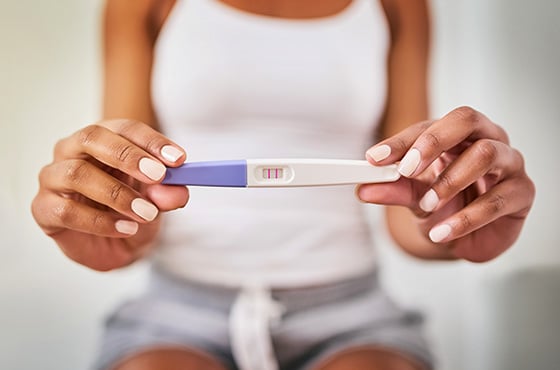At one point or another most of us thought that the ability to get pregnant would be akin to a traffic light: one minute you’re stopped at a red, then the green light appears and, voilá, you’re pregnant! However, in reality, the odds of a healthy, sexually active couple getting pregnant each month is only about 20 percent. “Even if the timing is perfect, the chance of any one given egg resulting in a pregnancy is pretty low,” said Dr. Lauren Roth from Shady Grove Fertility’s Frederick, MD and Rockville, MD offices in an interview with SELF. Roth helped SELF identify eight things women can do if they want to get pregnant now.
Medical contribution by:
Lauren Roth, M.D.
Medical Director
Here’s a roundup:
1. Track your period.
The average cycle is about 28 days with ovulation taking place on day 14. SELF advises, “If your cycle is shorter than 21 days, longer than 35, or changes drastically from month to month, it may be hinting at issues with your ovaries, which could affect your chances of getting pregnant.” An appointment with your physician can help begin to define whether there’s a problem and start to map out a solution.
2. Talk with your gynecologist.
Dr. Roth says, “People sometimes forget about meeting with their OB/GYN before trying to get pregnant.” Your gynecologist can help during this important step by reviewing whether the medications you take may be harmful during pregnancy, performing a Pap smear, and any immunizations.
3. Cut down on caffeine.
Most experts agree that moderate coffee intake will not affect chances of conception but there are questions about whether all-day coffee and caffeinated beverage drinkers may be reducing their odds. SELF cites the Mayo Clinic’s advice to limit intake to one to three brewed cups of coffee a day, or 150-300 milligrams a day. Other research indicates increased rate of miscarriage associated with more than 200mg per day. Due to the often conflicting research, SGF advises patients that the safest level of caffeine during pregnancy is zero.
4. Curb your alcohol intake.
There’s an old joke among OB/GYN that there wouldn’t be patients without alcohol, but it is important to cut down on drinking when actively trying to conceive. You might not know you’re pregnant the first 4 to 8 weeks; however, this is a vital time in fetal development when many organs are growing. It has also been shown that excessive conception of alcohol can impact sperm quantity and quality. So for couples who are activity trying to conceive, or in the near future, it is advised for both partners to reduce alcohol intake.
5. Give up smoking.
The effects of smoking on fertility is just one of myriad health problems cigarettes can cause. Regarding fertility, Dr. Roth told SELF, “We don’t know exactly how smoking affects fertility, but it increases the rate at which your body uses your eggs.” This means that for some reason, a woman’s eggs die faster when she’s a smoker. With only a limited number of eggs to begin with, maintaining your egg quantity and quality is essential to successful conception. Similar to alcohol, smoking cigarettes can have a negative impact on sperm quality. Find out more about the impact of smoking: “Smoking and Fertility”
6. Take prenatal vitamins.
Prenatal vitamins provide essential nutrients that can help with fetal development and prevent against defects in early stages of pregnancy. “We want folic acid levels to be adequate before pregnancy because it helps prevent neural tube defect, which is basically a problem with fusion of the spine that can result in paralysis and other long-term problems,” says Roth. Learn more: “Choose the right prenatal vitamin”
7. Know when you’re ovulating.
Once you have your period calendar, finding out when you ovulate will help you figure out exactly when your chances of conception are highest. There are a range of ovulation kits that can help identify your prime days. SELF says, “Since sperm can live in the female body for 3 to 5 days, having sex a few days before ovulation, the day you ovulate, and the day after can help make conception more likely.”
8. Consider egg freezing.
For a woman in her 30s who isn’t looking to conceive in the near future, egg freezing has become a popular option to preserve her ability to have children. At Shady Grove Fertility there are an array of financial programs to make egg freezing more affordable. “At this moment, you have the most, best-quality eggs you’re ever going to have,” says Roth. Learn more about egg freezing.
Like these 8 tips to get pregnant? To learn more or to schedule an appointment with an SGF physician, contact our New Patient Center at 877-971-7755 or fill out this brief form.
Editor’s Note: This post was originally published in May 2016 and has been updated for accuracy and comprehensiveness as of January 2019.







